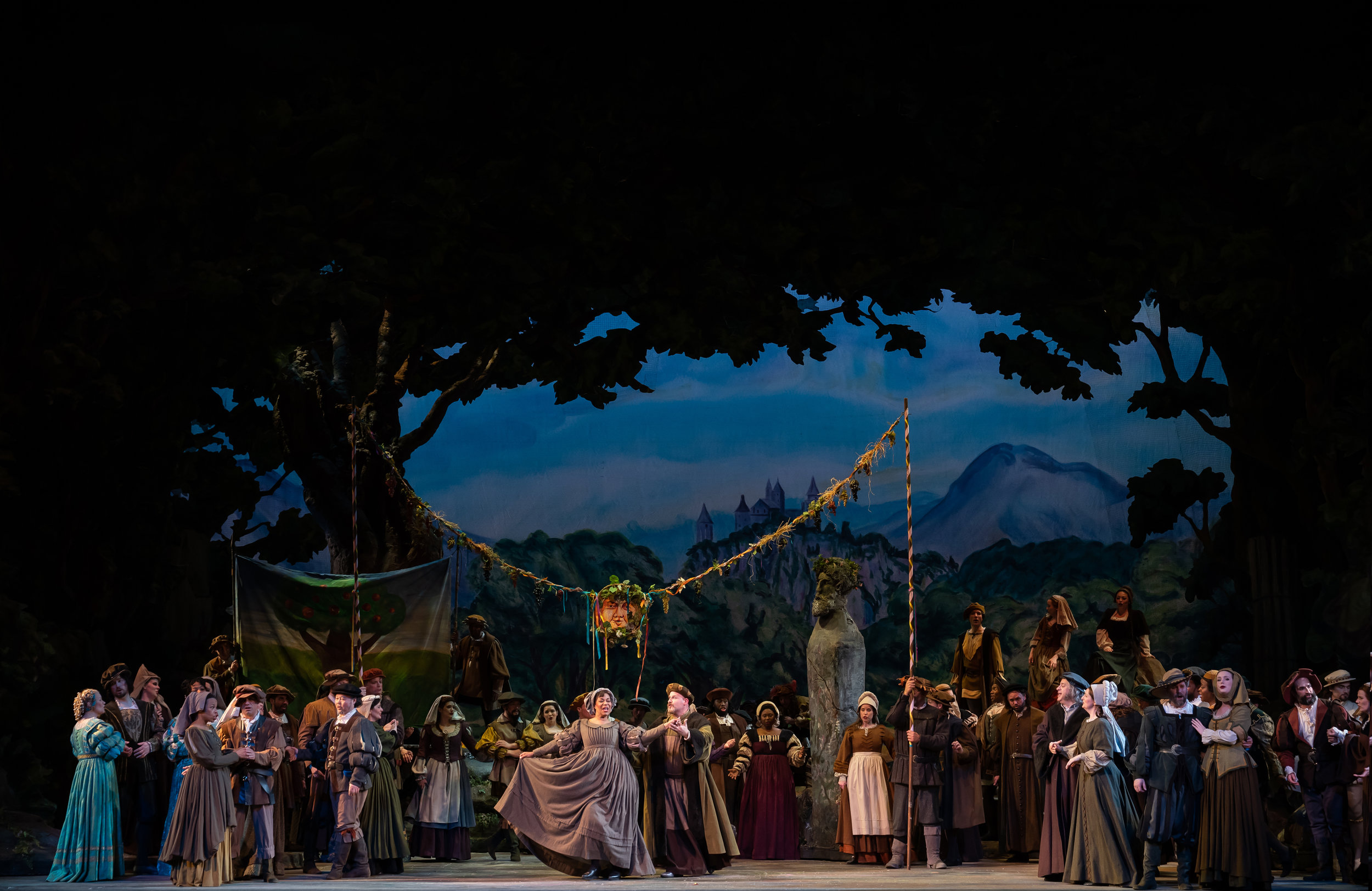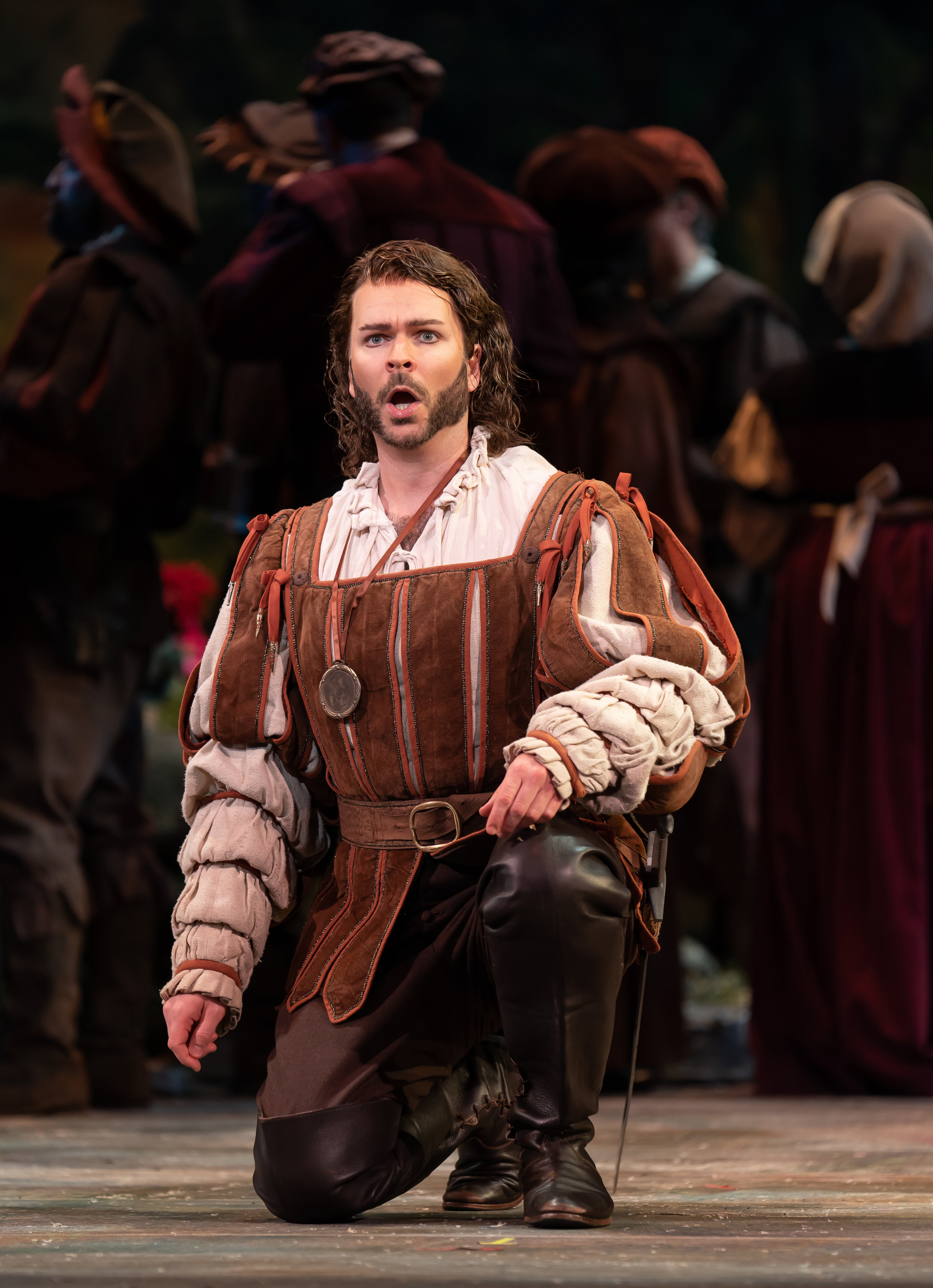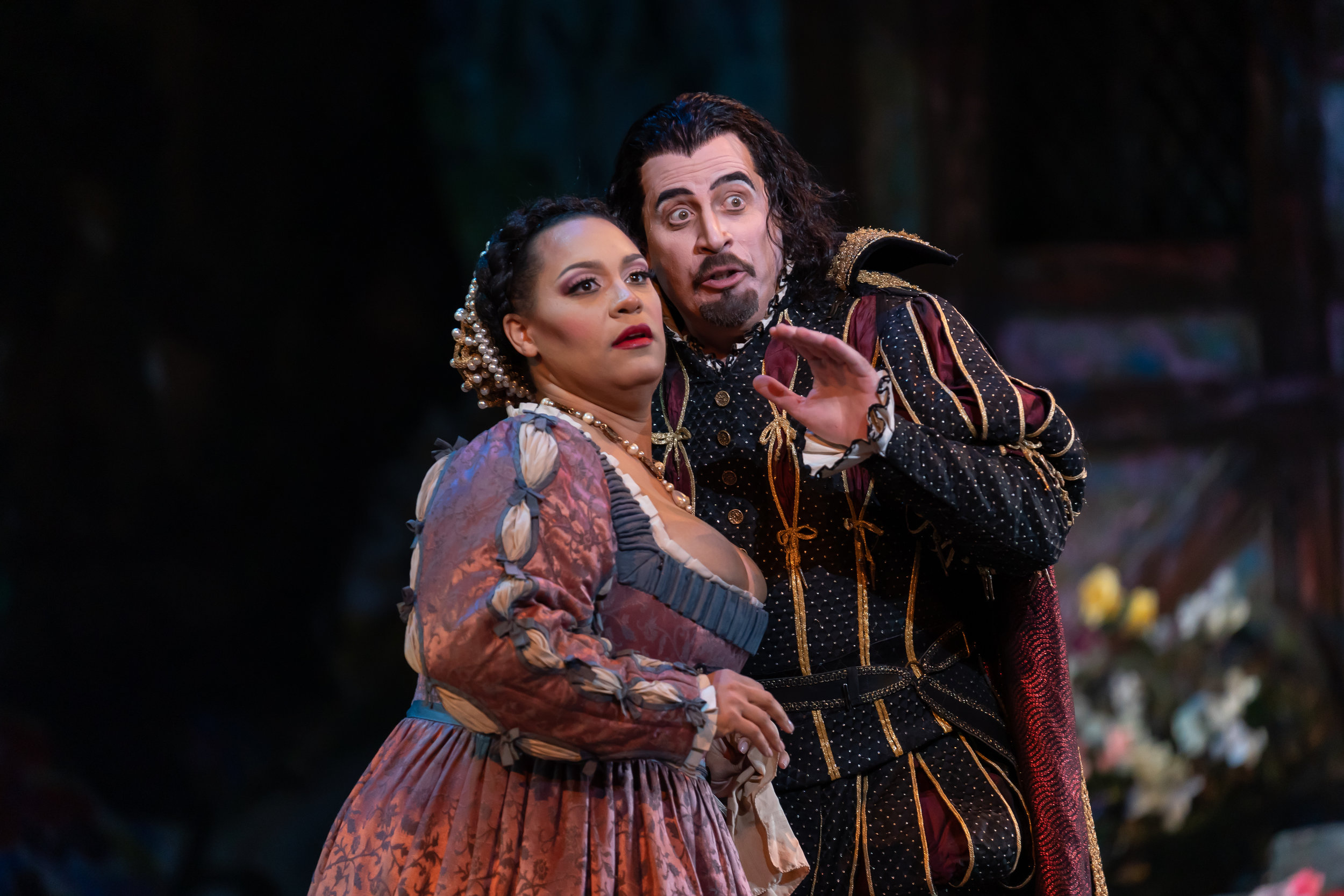Yeah, I have a few criticisms, but the bottom line is that Washington National Opera production of Faust (1859) is a good show and in total a better than average opera. If you love traditional opera, it might just be what you have been waiting for. The selling point for the opera is composer Charles Gounod’s pleasing music and the individual scenes, and the selling point for this production of Faust is the staging, including some fabulous sets. If you read my blog report on Eugene Onegin, WNO’s other ongoing production, you know I was unhappy with the sets and staging. Faust’s staging swings in the other direction, bolstering the performance.
Bass Raymond Aceto as Satan - you’re gonna love him…until the charm wears off. Photo by Scott Suchman; courtesy of Washington National Opera.
Basic premise of Faust – an old man sells his soul to Satan to restore his youth, but in the opera that is just the beginning. The term “Faustian bargain” is often used in discussions of politics and finance, and as WNO dramaturg Kelly O’Rourke alludes to in her program notes, it fits our approach today to the environment and climate change. Indeed, the universality of the theme of sacrificing long-term gain for short-term profit is a staple of plays, movies, and life. The librettists for Faust, Jules Barbier and Michel Carré based the opera, with changes, on Part I of Johann Wolfgang von Goethe’s monumental two-part play by the same name. – Spoiler Alert - In the opera’s case, the bargain Faust makes is to regain his youth and the devil’s services on earth by agreeing that later he will do the devil’s bidding in Hell. (FDA warning label – this is a bad bargain; I repeat, a bad, bad bargain!) What Faust wants most are the pleasures that the world can afford, especially young women, and Satan closes the deal by showing him a vision of the beautiful young maiden Marguerite, who is also innocent and pure, and thus, a delicious target for the devil himself. If Faust can make her his conquest, he will unwittingly also be making her Satan’s conquest. Faust succeeds in seducing her only to abandon her, carrying his child, causing Marguerite to become a social outcast. Her brother Valentin who had adored her, returns from war, and outraged, challenges Faust to a duel that he loses due to the devil’s intervention; before dying he curses his sister. Marguerite, realizing Satan’s involvement, kills her child and is cast into prison. Faust visits her in prison, but she rejects him and prays for forgiveness; she is taken into heaven. Satan, angry about losing Marguerite, takes Faust to hell. When the opera began, I thought Faust was to be the central character, but at the end it seemed more about Marguerite; it was almost bait and switch, and left me wondering what the librettists were trying to convey. German opera companies tend to give their productions the title of Margarethe for that reason and to distance the opera from their beloved Goethe. Gounod made several changes to the opera over time such as replacing speaking sections with recitative. The WNO production is sans the ballet that Gounod later added to the beginning of Act V; the WNO production still runs over three hours.
Soprano Erin Wall as Marguerite and tenor Marcelo Puente as the young Faust in one of the fairytale sets. Photo by Scott Suchman; courtesy of Washington National Opera.
Satan, sung by bass Raymond Aceto, who was also in WNO’s Ring, carried the momentum forward. Mr. Aceto has a fine bass voice and acquitted himself well. He does an aria where he literally “prays” that nothing goes wrong with his plans that is remarkable. Throughout the evening, he effectively switches from being charming and then quickly diabolical; I liked him and then felt a quick chill that reminded me he was the devil and not an anti-hero. The movies and television have conditioned us to like the bad guys (the anti-hero, a bad guy who takes on bad guys who are even worse) because they carry the action forward, and we love the action. Faust is the weak link in the story, and unfortunately on Saturday night, as sung by tenor Marcello Puente, he was the least impressive singer; I anticipated more from Mr. Puente; maybe it was an off night, though his transformation from old man to young stud was neat. Marguerite represents the challenge, both for Faust and Satan, and as played by soprano Erin Wall, she was up to the challenge; she sang and acted beautifully, especially in the Jewel Song where the devil made the right call to sweeten her path to destruction. The singers in the supporting roles turned in admirable performances, especially mezzo-soprano Allegra De Vita, now a WNO regular, who sang with power and emotion playing Marguerite’s secret admirer Siébel with touching effectiveness. Baritone Joshua Hopkins surprised me with the strength of his voice and portrayal - kudos. Probably the singer with the most compelling stage presence was Deborah Nansteel who has an attractive, powerful mezzo-soprano voice. She played a neighbor who unwittingly aided Marguerite’s seduction but failed in her own comic attempt to seduce the devil.
The townspeople celebration scene; another of the charming sets. Photo by Scott Suchman; courtesy of Washington National Opera.
The sets and staging were impressive in color and design, adding as advertised, a fairytale flavor. Kudos to Earle V. Staley for the set and costume design. This production was originated by the Houston Grand Opera. See if you can find the faces in the curtain as you maneuver to your seat. The opening act was very well done, ending with a theatrical flash of light and the appearance of the young Faust. There were more theatrics – the devil made wine flow from a fountain, and he broke Valentin’s sword. These generally worked effectively. Act IV with Valentin’s return and death seemed the most effective as serious dramatic opera; his death scene with the crowd urging his forgiveness of Marguerite was gripping. The last set was breathtaking. Director Garnett Bruce does a fine job, though the staging misfires in a couple of ways. The play within in a play going on at the country celebration can’t compete with the devil’s antics and is mostly wasted, though the irony isn’t. I also admit I had difficulty following what was transpiring at in Act IV’s church scene where Marguerite goes to repent and is confronted by a demonic choir and Satan. Finally, we learned of the baby’s death from Faust when he visited her in prison; that’s a pretty powerful event to just say, oh and by the way, how could you have killed your kid? In all, the plot fails to develop a central theme sufficiently to fully engage us in the drama, especially in passing over too quickly the personal tragedy of Faust’s decision. The focus is its impact on others which divides attention. Each scene has its own interest and the combination works overall, but to me, it comes across as a variety show, though a good variety show.
left: Baritone Joshua Hopkins as Valentin. right: Mezzo-soprano Deborah Nansteel as Dame Marthe, Marguerite’s neighbor, and bass Raymond Aceto as Satan. Photo by Scott Suchman; courtesy of Washington National Opera.
Gounod’s music is beautiful and worth attending the opera to hear. Even if you haven’t heard it before, I suspect some of the melodies will be familiar to you. The orchestra under Conductor Keri-Lynn Wilson played well I thought. While fully supporting the action on stage, the music nevertheless drew my attention because of its beauty on several occasions. At the first intermission, my wife said to me, “I am grooving on the conductor’s long, bouncing ponytail. Hope we see more females.” Though I was pleased that there was a female conductor when I first saw Faust announced, I had not thought about it to that point in the performance. Though Maestro Wilson got the job due to her qualifications and is rightfully judged by her performances, the paucity of opportunities given to female conductors is well known. It was gratifying to see some gender-neutral hiring being done; kudos to WNO, and yes, that did make me feel more warmly toward this production. The WNO chorus as usual under Steven Gathman’s direction performed beautifully.
The Fan Experience: Washington National Opera has three more performances of Faust scheduled, March 22, 24, and 27. Unless you have a strict rule about not wanting to know the story ahead of time, I strongly recommend reading a detailed synopsis of Faust before attending to really stay up with the drama in the last Act. Pick one online before the performance; the one in the Program handed out at the performance is too brief.
I took the subway to Saturday’s performance and should have checked Metro’s status and alerts page. They were doing single tracking from Ballston to Rosslyn. I had to change from the Silver to the Orange Line in Ballston, causing a 25-minute delay that resulted in me missing the first half of the pre-opera talk, which was given by the amiable Ken Weiss, Principal Coach of the Domingo-Caftitz Young Artists, and was focused on the opera’s musical elements in the half of the talk that I heard.





